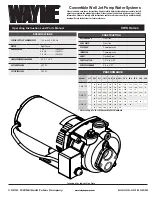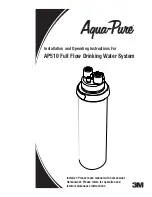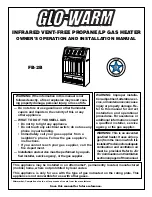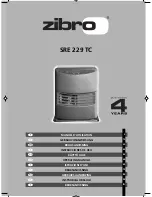
17
The following extract is taken from latest G3 Regulations
Discharge pipes from safety devices
Discharge pipe D1
3.50
Safety devices such as
temperature relief valves or combined temperature and pres-
sure relief valves
(see paragraphs 3.13 or 3.18) should discharge either directly or by way of a
manifold via a short length of metal pipe (D1) to a
tundish.
3.51
The diameter of discharge pipe (D1) should be not less than the nominal outlet size of the
safety device, e.g.
temperature relief valve
.
3.52
Where a manifold is used it should be sized to accept and discharge the total discharge from
the discharge pipes connected to it.
3.53
Where valves other than a
temperature and pressure relief valve
from a single unvented
hot water system discharge by way of the same manifold that is used by the safety devices, the
manifold should be factory fitted as part of the
hot water storage system unit
or package.
Tundish
3.54
The
tundish
should be vertical, located in the same space as the unvented
hot water stor-
age system
and be fitted as close as possible to, and lower than, the safety device, with no more
than 600mm of pipe between the valve outlet and the
tundish
(see Diagram 1).
Note
: To comply with the Water Supply (Water Fittings) Regulations, the tundish should incorpo-
rate a suitable air gap.
3.55
Any discharge should be visible at the tundish. In addition, where discharges from safety
devices may not be apparent, e.g. in dwellings occupied by people with impaired vision or mo-
bility, consideration should be given to the installation of a suitable safety device to warn when
discharge takes place, e.g. electronically operated.
Discharge pipe D2
3.56
The discharge pipe (D2) from the
tundish
should:
a. have a vertical section of pipe at least 300mm long below the tundish before any elbows or
bends in the pipework (see Diagram 1); and
b. be installed with a continuous fall of at least 1 in 200 thereafter.
3.57
The discharge pipe (D2) should be made of:
a. metal; or
b. other material that has been demonstrated to be capable of safely withstanding temperatures
of the water discharged and is clearly and permanently marked to identify the product and per-
formance standard (e.g. as specified in the relevant part of BS 7291- 1:2006 Thermostatic pipes
and fittings for hot and cold water for domestic purposes and heating installations in buildings.
General requirements).
3.58
The discharge pipe D2 should be at least one pipe size larger than the nominal outlet size
of the safety device unless its total equivalent hydraulic resistance exceeds that of a straight pipe
9m long, i.e. for discharge pipes between 9m and 18m the equivalent resistance length should
be at least two sizes larger than the nominal outlet size of the safety device; between 18 and
27m at least 3 sizes larger, and so on; bends must be taken into account in calculating the flow
resistance. See Diagram 1, Table 3.1 and the worked example.
Summary of Contents for Flexistor 1000
Page 30: ...30 38 Part No 95 607 690 46 Part No 95 980 009 2 1 34 1 46 ...
Page 31: ...31 48 38 30 38 31 32 ...
Page 32: ...32 ...
Page 33: ...33 ...
















































